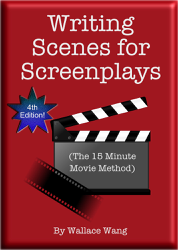In action films, it’s easy to see two people physically fighting each other to achieve a goal where only one can win. When you watch a physical battle, you can see how the momentum shifts from the hero to the villain and back again. Initially, the hero seems to be winning, then the villain takes control and looks like the hero will lose. Finally, the hero takes back control and defeats the villain. Watch this clip from “Rocky III” to see how this physical battle works.
Once you understand that physical battles revolve around two characters fighting for a goal where only one can win, you can better understand how to write scenes where there is no physical fighting. When two characters talk in a scene, they’re fighting with words.
That’s the key to writing great dialogue. Always focus on two characters trying to defeat the other one using words. Characters tell stories, use analogies, and say practically anything EXCEPT what’s really on their mind. This creates dialogue that’s engaging and interesting because it forces the audience to figure out what the character is really saying and what they’re trying to accomplish.
Then when the scene ends, one character is the clear winner and the other is the clear loser, just like the “Rocky III” fight scene where Rocky boxes Clubber Lang and only one can win the fight.
In this scene from “Good Will Hunting,” a young man (played by Matt Damon) is in the park with a psychiatrist (played by Robin Williams). The goal of the young man is to avoid therapy while the goal of the psychiatrist is to convince the young man that the only way he can make his life better is by being willing to be vulnerable.
Notice that in the beginning of the scene, the young man is cocky and taunts the psychiatrist about why they’re in the park in the first place. Then as the scene continues, the psychiatrist slowly gains the upper hand until he finally defeats the young man and forces him to realize he’s not as tough as he thinks.
When writing dialogue, always think of a physical battle like in “Rocky III”, and then translate that fight into a verbal battle in your own scene. The purpose of dialogue is to defeat another character with a conclusive resolution where it’s clear who won and who lost.
Sign up to take a FREE course about how to write scenes in a screenplay.

